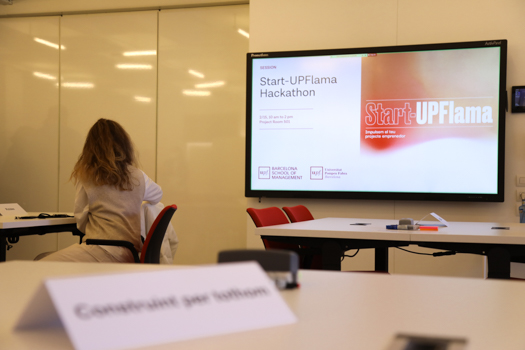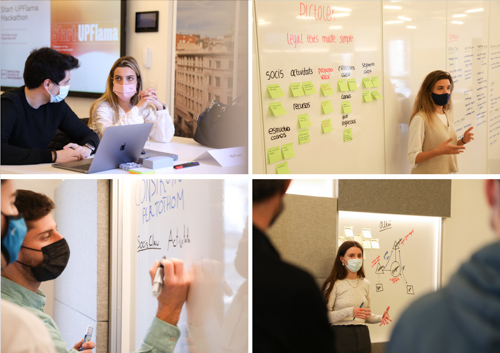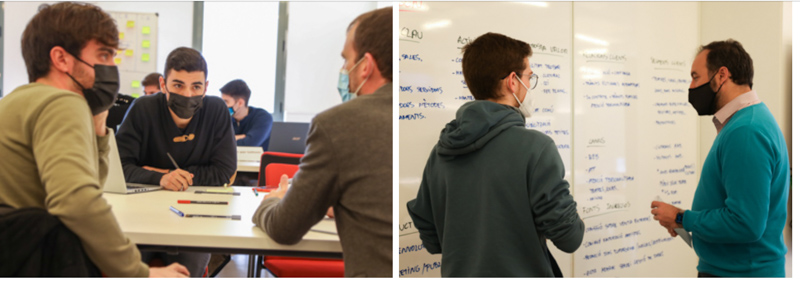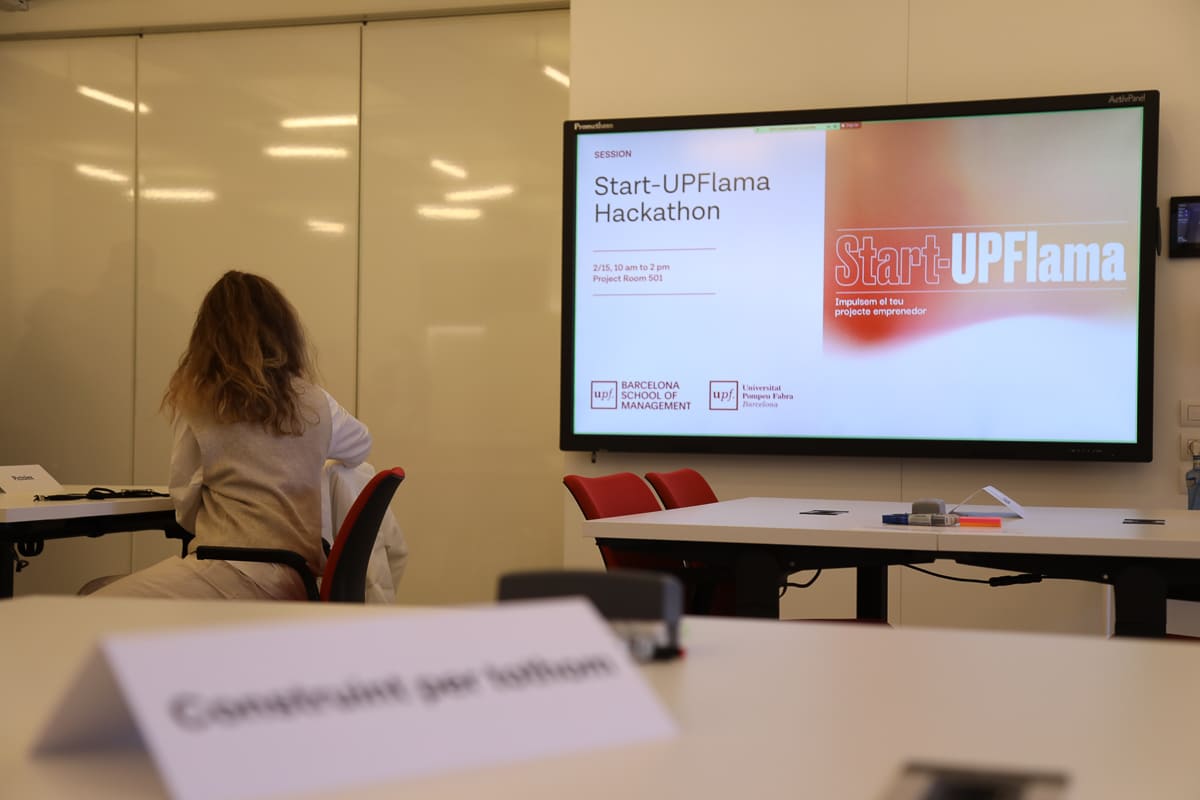This Tuesday, UPF-BSM has organised the first Hackathon for Start-UPFlama in which nine of the twelve registered projects have benefited from mentoring sessions offered by the faculty of the School in areas such as sustainability, marketing, finance or human resources, among others.

The UPF Barcelona School of Management (UPF-BSM) has organised this Tuesday the first Hackathon for Start-UPFlama, a programme to support the creation of innovative companies addressed to students and alumni of the Pompeu Fabra University (UPF) that aims to promote entrepreneurship in the university community.
"From UPF-BSM we want to help you in one of the most difficult phases of any entrepreneurial project: the beginning", said the Vice-Dean for Knowledge Transfer, Ramon Bastida, who admitted that they are now facing "a great challenge". Bastida, in turn, celebrated the fact that UPF-BSM can lead this hackathon in its facilities and put the expertise of its faculty at the service of the students.
The collaboration between UPF and UPF-BSM to hold this hackathon is great news and shows that, although talent tends to be sought outside, it is often within
In this sense, the Vice-Rector for Knowledge Transfer at UPF, Eulàlia de Nadal, acknowledged that often "people try to look for talent and expertise outside". "The collaboration with the UPF-BSM is great news and the best example of the fact that talent is often found within". As the Vice-Dean said, the hackathon is a "great opportunity to build bridges in terms of knowledge transfer" between the two institutions.
UPF-BSM expertise at students' serviceUp to nine projects have benefited from the mentoring sessions offered by UPF-BSM experts in subjects as diverse as operations, supply chain and technology, led by the Director of the Sustainability Observatory, Oriol Montanyà; marketing and communication, with the Director of the Business & Management Strategy Dept., Carolina Luis; finance, thanks to the Teaching Assistant of the Finance, Accounting & Control Dept., Andrei Boar; human resources management, with the Director of the Master in Human Resources Management, Mariano de las Heras; legal, by Ramon Salelles, Professor of Commercial Law UPF; and technological strategy, thanks to Albert Domingo, Head of Entrepreneurship at UPF.
For more than two hours, and after selecting the three most relevant business areas for their projects, the registered groups received advice from experts to arrive as prepared as possible to Start-UPFlama final on 23 February. "Today we have discovered our weakness, but we have also opened a window of opportunity", admitted Rosana García, a student of Biomedical Engineering at the UPF and one of the incubatees with VirTest, a project that aims to find new devices to improve current ones in the field of cardiovascular diseases using new technologies based on artificial intelligence (AI), 3D printing and augmented reality (AR), among others.
Most projects have been interested in determining their business model, defining sources of funding and, above all, establishing how to monetise the product
"We have a very good human and technical capital and a clear mission and vision, but the business set-up is weaker", acknowledge the representative of VirTest who, in addition to finance, has requested mentoring in legal issues and human resources management. "We have been pleasantly pleased with the talks because we have seen that our project can be attractive to European subsidies, which is what we were most concerned about", said García.
According to one of the professors who advised the students, Andrei Boar, who is in charge of financial management, most of the projects were interested in "determining their business model, defining sources of financing and, above all, establishing how to monetise the product". These needs, he stressed, must be resolved from different areas of knowledge, which is why sessions such as today's are "essential". "We hope that our advice has helped them and that it does not end today and that they will contact us again in the future", he concluded.
In this regard, Oriol Montanyà, professor in charge of the sessions on operations, supply chain and technology, considered that the UPF-BSM can "accompany the development of all these ideas". "In the business world, we know that 10% of success corresponds to the idea and 90% to excellence in its execution", he stated.

The mentors agreed that technological innovation and sustainability are the two most common themes in the projects presented. Food to Feed, for example, is a business idea by UPF Management & Business Administration students Aaron Fernández and Marc Caballero, and UPF Economics student Cristina Prat, which aims to "become a new way of producing food by taking advantage of the waste and surplus produced in the food chain itself". Meanwhile, Construint per a tothom, by Albert Redondo and Pau Felip, both students of Business & Science Management, aims to use the circular economy to "recycle shipping containers to provide decent housing for people at risk of social exclusion".
We know that 90% of the success of a project is due to excellence in its execution. From the UPF-BSM we can accompany young entrepreneurs and provide them with know-how in areas such as sustainability
"Many of the projects have sustainability as the backbone", said Oriol Montanyà, also Director of the Postgraduate Course in Total Supply Chain Management, who added: "this shows that the union of economic, social and environmental sustainability can be an opportunity for differentiation". "From the UPF-BSM we can provide know-how on sustainability issues thanks to entities such as the Sustainability Observatory, the Mercadona Chair of Circular Economy or the Triodos Chair of Sustainable Finance", valued Montanyà.
Other participants in the hackathon were Carlota Albanell, lawyer and economist and UPF alumni, with Pictolex, a project created to "make contracts that people understand"; Albert Lleó, Nicolás Pérez and Mario Ceresa, UPF alumni and employees at AI Software Engineer, with Ahcarya, an application "focused on yoga that uses AI to help the user and the teacher to correct the postures performed"; SomBCN, a multiplatform tool that has the aim to "dynamise and democratise the consumption of culture in Barcelona", created by Víctor Aguado, Xavier García and Víctor Ferrer, engineering students; María Sánchez Lobato, a graduate in Political Science, with Acta Diurna, a "decentralised and democratised network of journalistic content, based on ethical protocols and good conduct"; and Altés, by Carla Altés, an International Business student at ESCI-UPF, which aims to be a "platform that connects artisans, designers and end customers".

